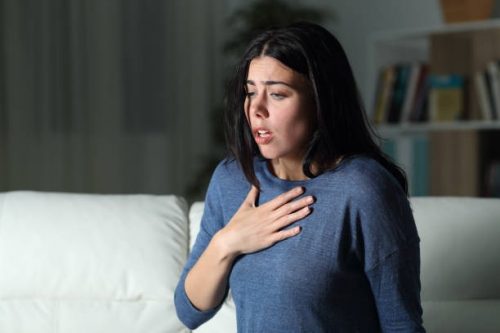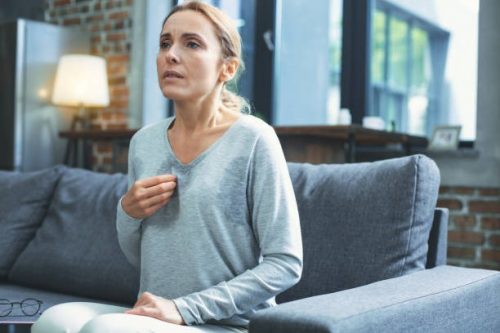Dealing with and managing anxiety chest pain, and other psychological conditions is not often something all of us know how to do. Some individuals can manage anxiety pains by simply changing their lifestyles and living a better one. Fortunately, some of the healthy habits like getting enough sleep, eating a well-balanced diet, exercising regularly, and socializing frequently can somehow help them manage their anxiety-related conditions. You may also do some coping techniques whenever you feel anxious. But what about those unfortunate ones who are constantly battling with common symptoms of anxiety disorder that seem too complicated?
Dealing With The Condition
Well, you might think that since there are therapies, counseling, cognitive behavioral therapy, and treatment resources and programs available, people with anxiety disorder can happily live their lives to the fullest. No, it’s not like that. The step of even seeking help can be extremely daunting and way stressful for those individuals who fear everything, this is a stress response that is completely normal just like in a fight or flight response. Some people may even isolate themselves when feeling anxious. Their severe stress and anxiety can cause them to malfunction emotionally, mentally, and physically which can take a toll on their everyday life.
Understanding The Condition
But going deeper into emotional and mental health dilemmas is just too broad to discuss. Thus, we will only focus on the physical manifestation of anxiety, particularly on the physical symptom of chest pain. Let’s understand what chest pain is, how it differs from ordinary ones, and how anxiety impacts the severity of the condition.
Managing Chest Pain And Anxiety
Chest pain is a sharp pain in the chest that is persistent and aching. It comes with a tight and with stabbing-like pressure accompanied by a burning sensation. In its usual state, it can immediately go away in minutes. It happens when there is a blood pressure flow complication or common inflammation around the heart and lungs., in a way it affects one’s blood supply. People with lung or heart disease and conditions commonly experience this. In some unfortunate instances, this connotes falling respiratory organs that often lead to cardiac arrest.
Be aware that they are normal. However, research and studies show that mental health conditions affect it more than usual. Thus, anxiety can trigger it in a lot of negative ways. Often, this lasts longer, for about an hour, and the sensation becomes worse. Understand that even though anxiety is a mental health condition, it still affects the function of the brain, which is connected to all the organs in the body. Therefore, the chest is not exempted.
The Difference Between Other Complications
You would know the difference between sudden chest pain and mental health-related chest pain when there is a gradual abnormal rhythm in your heart rate that steadily stays. Since chest pains are non-serious most of the time, the steady manifestation of the physical problem says otherwise. So if you are dealing with anxiety problems and suddenly experience chest pain for the first time (you experience anxiety chest pain) you should consult a medical professional right away to get an accurate diagnosis of your condition.
Cardiac chest pain is not something you should ignore because, in unnoticeable times, it is a life-threatening situation. If you constantly experience it or as often as daily, it is not something you should not shrug off, especially if it has already lasted for more than five minutes. It is very alarming and requires immediate medical attention as it is close to an emergency state. Generally, one can visit the emergency room or emergency department for anxiety if they are experiencing severe anxiety and panic episodes that are already uncontrollable for more than 30 minutes. In some cases, people who are already discharged from emergency care may experience some bouncebacks wherein they return within an acute time period, this is called emergency department recidivism.
Physical Symptoms
You know that anxiety causes different kind of physical symptoms that affects physical manifestation. These include trembling, shakiness, headaches, nausea, heart palpitation, stomach pain, shortness of breath, and low-risk chest pain or anxiety-induced chest pain. These physical attacks can happen at any time, especially when there is a constant feeling of impending danger.
In some unfortunate instances, the heightened reaction of anxiety often results in panic attacks that cause the possible connection to a heart complication and panic disorder. Thus due to sympathetic overactivity, a contraction of the small vessels of the heart becomes a problem.
While chest pain is not at all serious in some instances, some cases of it lead to heart failure. And that is not something someone would wish to deal with, especially when the goal is to feel emotionally and mentally okay. It is better to have yours check before it becomes an increased risk
Frequently Asked Questions
Here are a couple of the frequently asked questions that you can use as a guide to provide you with quite significant information about the physical symptoms or manifestations of mental health problem anxiety.

How do you get rid of anxiety chest pain?
Home remedies for it include taking control of the situation. Acknowledge the anxiety you are feeling, recognize them, and then find ways to manage them effectively. Learn to do correct deep breathing exercises. Focused and profound breaths can effectively relax both your body and mind. Be positive about your mental and physical health. It would also help to utilize relaxation and calmness apps to help you visualize beautiful and peaceful scenery.
How does anxiety chest pain feel?
Chest pain is characterized by shooting and piercing pain. It is a persistent pain in the chest, which usually presents unusual muscle twitches or squeezing sensations in the chest.
You can easily deal with it by breathing in slowly and relaxing your whole upper body in some cases. But if in case it persists, call your doctor right away so they can provide initial treatment.
Does Lorazepam help with chest pain?
If the one that you’re feeling is secondary to anxiety, your doctor may recommend anxiolytics. These forms of drugs may help you to calm down and relax. Alprazolam and Lorazepam have commonly prescribed anxiolytics.
Is it my heart or anxiety?
Individuals who experience panic attacks frequently report that when they have anxiety, they are having a heart attack, as a lot of panic disorder and anxiety symptoms mimic the latter. Both illnesses could be accompanied by chest tightness, sweating, dizziness, shortness of breath, or even temporary paralysis or physical fatigue.
Don’t Self Diagnose
But note. Never self-diagnose. Even if you feel like those are heart attack symptoms, it would be best to endeavor professional advice whenever you feel like you are having a heart problem or heart attacks. Do not attempt to cure yourself based on searching for medical treatment or remedies online.
What is Cardiac Anxiety?
Individuals with cardiac anxiety experience ‘fear of fear.’ They always monitor themselves and are overly concerned about the condition of their heart. It is why they are constantly in a state of alarm. Typically, they are not aware that they are like this. There are no physical causes of cardiac anxiety.
Can chest pain from anxiety last for days?
There is a higher likelihood that this is chest wall pain resulting from muscle contraction occurring with anxiety. As a matter of fact, due to these extreme muscle contractions, the chest could stay painful for hours or even days following a manic episode.

Can you have anxiety and chest pain all day?
Chest pain secondary to anxiety or panic attacks usually lasts for about 10 minutes. However, other symptoms could linger for up to one hour and can even cause heart attack. Usual anxiety and panic attack symptoms can include lightheadedness.
Can anxiety chest pain last for weeks?
Consult your doctor if chest pain persists, worsens, or accompanies other signs and symptoms. A serious condition does not probably cause pain lasting for weeks or months. The problem is most likely associated with a muscular or skeletal structure.
Have Proper Diagnosis
Remember that whether you have lived with it for several years or have developed it due to a certain health condition, you still need to have a diagnosis. If it is causing you shortness of breath or in a shallow manner and cause dizziness or chest tightness, immediately seek medical assistance.
How do I relax my chest muscles?
Stretching your pectoralis muscles helps relax the whole chest musculature. It is done by just raising your forearm and elbow up against the frame of a door. Move your arms up or down, depending on where you want the stretch to be. You must twist your torso gently away from your arms and find the tight areas during this position.
Does Anxiety Give You Chest Pains?
Panic and anxiety attacks can cause chest pains. Several related symptoms may include palpitations, trembling, lightheadedness, feeling short of breath, and tingling.
But with all these symptoms, you must understand the other health complications associated with chest pain. That way, you wouldn’t end up assuming that you have all sorts of diseases and mental health conditions.
Is Anxiety Bad For Your Heart?
Anxiety can result in a rapid heartbeat, chest pain, and palpitations. You can also have a higher likelihood of experiencing increased blood pressure and heart problems. If you have an existing heart condition, anxiety disorders may increase the likelihood of coronary disease. Some typical and atypical symptoms of acute coronary syndrome include back pain or shooting pain, and muscle tension, that is described as burning, stabbing, or characteristic of indigestion (atypical) while typical symptoms include dull ache in arms, jaw, and chest. It is best to seek medical attention if you’re experiencing frequent anxiety attacks.
How Can You Tell The Difference Between Chest Pain And Anxiety Chest Pain?
While chest pain is typical of both a heart attack and a panic attack, the pain qualities are not often the same. In panic attacks, chest pain is commonly stabbing or sharp and specific to the mid-chest. Chest pain due to a certain heart attack may mimic a squeezing sensation or pressure.
What Is Bad Anxiety?
Generalized anxiety disorder or GAD, is a form of anxiety disorder described as chronic. It is usually accompanied by extreme tension and worry, even when there is nothing to be worried about.

Anxiety Insights
Anxiety may be a mental health problem, but it does not mean it cannot affect your overall function and internal organs. It is a condition that makes the whole system of your body fail. When situations are not entirely threatening, the stress rate heightens, and the whole body, including the heart, works ten times more than it should.
How Long Does Anxiety Chest Pain Last?
How Do I Know If My Chest Pain Is Anxiety?
Why Is My Anxiety So Bad My Chest Hurts?
Why Is Anxiety Chest Pain So Bad?
Can My Chest Hurt All Day From Anxiety?
